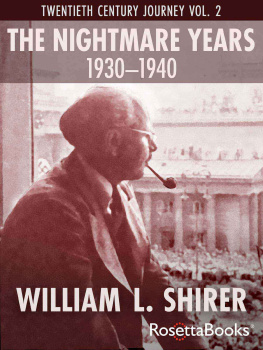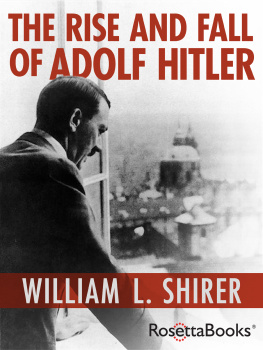The
Collapse of the Third Republic
An Inquiry into the Fall of France in 1940
William L. Shirer
The Collapse of the Third Republic
Copyright 1969, 2014 by William L. Shirer
Cover art, special contents, and electronic edition 2014 by RosettaBooks LLC
All rights reserved. No part of this book may be used or reproduced in any form or by any electronic or mechanical means, including information storage and retrieval systems, without permission in writing from the publisher, except by a reviewer who may quote brief passages in a review.
Cover design by Alexia Garaventa
ISBN Mobipocket edition: 9780795342486
To the memory of my brother John,
who died suddenly
as the last lines of this book
were being written
Contents
FOREWORD
This is the second book in which I have attempted to set down out of my own experience and from the mass of historical material that eventually became available what happened to a great European nation in the years that were climaxed by the Second World War. In the first work I wrote of the rise and fall of Nazi Germany and how it came that a cultured, Christian people lapsed into barbarism in the midst of the twentieth century, gladly abandoning their freedoms and the ordinary decencies of human life and remaining strangely indifferent to the savagery with which they treated other nations, other races. I was aided in that task by the availability of a unique source of information: the secret archives of the Third Reich, which were captured by the Allies at the end of the war. I was helped too, I feel, by a personal acquaintance with Nazi Germany, in which I had lived and worked during more than half its twelve years of existence.
The lack of the perspective of time for all who labor in the field of contemporary history is more than compensated, I believe, by the experience of having lived through the events themselves, by the firsthand knowledge one acquires of the leading characters caught up in them, by the feel one gets for the nature and mood of the country, the society, the institutions, and above all the people at a time of crisis. The History of the Peloponnesian War does not suffer, it seems to me, for Thucydides having lived through, as he tells us, the whole of the war, of which he has left us such an unforgettable account. One is grateful to him for not leaving the writing of it to others who came later.
I lived and worked in France for a good many years, beginning in 1925 when the country was not only the greatest power on the continent of Europe but, to me at least, the most civilized and enlightened. In the ensuing years I watched with increasing apprehension the Third Republic go downhill, its strength gradually sapped by dissension and division, by an incomprehensible blindness in foreign, domestic, and military policy, by the ineptness of its leaders, the corruption of its press, and by a feeling of growing confusion, hopelessness, and cynicism (Je men foutisme) in its people. And though at the beginning of the 1930s I left for assignments elsewhere, I returned frequently to Paris throughout the decade and thus was able to keep in touch with the deterioration one could seeor at least feelall around.
From the very beginning I liked the country and the people, became sympathetically involved in discussion and study of their problems, their leaders, their politics, their journalism, their literature, and like Jefferson and many other Americans who have lived and worked there, came to feel that Paris was my second home, a sentiment that has never left me. Though I did not try to hide my sympathies and prejudices, I was, after all, a foreigner, and this gave one a certain objectivity, keeping one out of the partisan battles and making one skeptical of many claims from the Right, Left, or Center. Since the extreme Right and Left in the thirties wanted, for opposite reasons, an end of the Third Republic, my affinities were with the Socialists on the Left, the Radical-Socialists in the Center, and the moderate conservatives slightly right of Center. These represented the vast majority of Frenchmen, were the bulwark of the Republic, and one hoped they would know how to preserve it through thick and thin.
Obviously the fall of France and the collapse of the Third Republic the summer of 1940 is a painful subject to Frenchmen and they would sooner forget it. Not many French historians have yet tackled it. Ren Rmond, the political scientist and historian, deplored in 1957 the lack of books on the last ten years of the Republic. Not only historians but journalists, he said, stayed off the subject, and even the learned journals were wary of approaching it. Since then a beginning has been made. Jacques Chastenet and Edouard Bonnefous have rounded out their multivolumed histories of the Third Republic with accounts of its last years and end. Earlier, E. Beau de Lomnie wrote well of its death, and other French historians have covered various aspects, among them Pierre Renouvin, Maurice Baumont, Franois Goguel, Ren Rmond, J-B. Duroselle and Pierre Dhers.
In no country, including my own, have I ever received such cooperation in the work of research as I got in France from historians, editors, librarians, and some of the leading political figures in the drama itself. The first three, besides offering new insights, guided me to material I would not otherwise have obtained and often provided it themselves from their own private sources. Paul Reynaud, the Premier during the last climactic months of the Republic, sent me letters and memoranda of great length in answer to my queries and supplemented them with long talks in his apartment behind the old Chamber of Deputies. Edouard Daladier, who was either Premier or Minister of Defense, or both, for four years until replaced by Reynaud toward the very end, talked with me for hours. These were the two key political figures during the last years of the Republic.
There were difficulties, to be sure. The main one was a law which forbids making available to scholars, or to anyone else, confidential state documents until they have gathered dust in the files for fifty years. But even after fifty years the French government holds back. I was informed in writing, for example, by the technical counselor of the Ministry of the Armies, M. de la Fournire, that unfortunately the archives of the Historical Section of the Army were not available to researchersnot even, he added, to the generals of the French Armyfor any period later than 1900. The French Foreign Office kindly sent me a copy of an order releasing for the perusal of scholars certain dossiers up to 1815, others up to 1849, still others up to 1896. It seemed to shy away from the twentieth century. Recently, however, the Foreign Office has begun to publish its confidential papers for the 1930s, though it has been handicapped by the loss of many of its original documents, burned in the courtyard of the Quai dOrsay on May 16, 1940, in a moment of panic when reports reached frightened officials that German tanks and troops were approaching the capital. Winston Churchill was among the notables who watched the bonfire from a second-story window.
Andr Chamson, director of the National Archives, wrote that he was deeply grieved that he could not make accessible the Riom Court papers I had asked to see. But we have to stick very firmly, he added, to the law of 50 years, especially in the matter of papers covering the last war and the occupation. Chamsons grief is genuine. He is a noted author and member of the Acadmie Franaise, and understands a writers problems. He was not, unfortunately, in this instance, the law. Even the eminent Professor Pierre Renouvin of the Sorbonne, himself in overall charge of the postwar publication of the states secret papers, was complaining in 1958 that the French archives are still not accessible, even to privileged researchers. And Reynaud and Daladier complained to me that, because of the law, they were being denied access to their own state papers acquired when they were in office, though Reynaud must have taken the bulk of his with him, for they pile up in his published memoirs.
Next page







